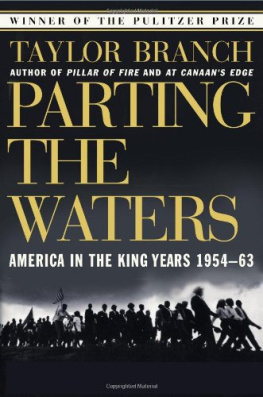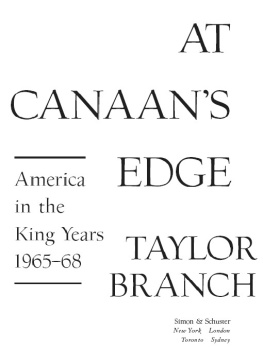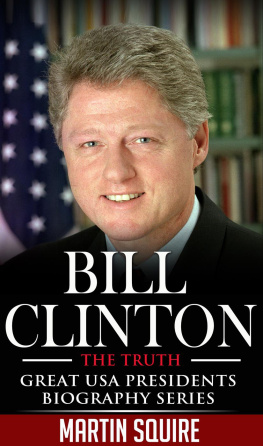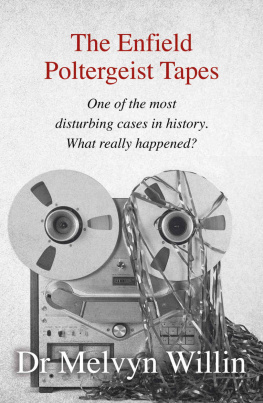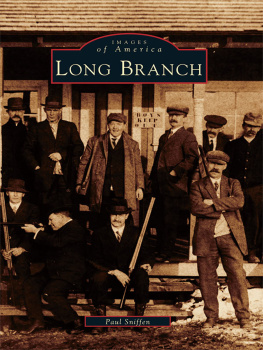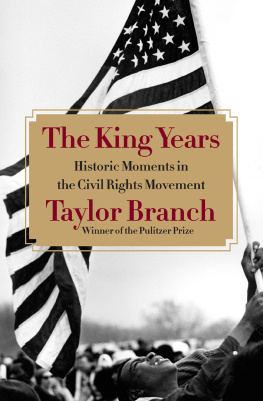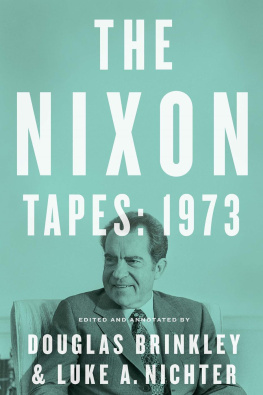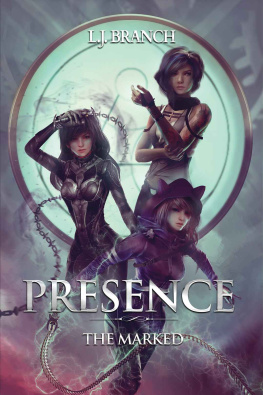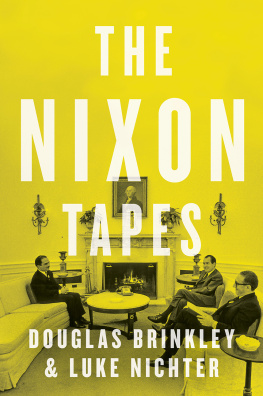TAYLOR BRANCH - THE CLINTON TAPES
Here you can read online TAYLOR BRANCH - THE CLINTON TAPES full text of the book (entire story) in english for free. Download pdf and epub, get meaning, cover and reviews about this ebook. year: 2009, publisher: simon & schuster, genre: Detective and thriller. Description of the work, (preface) as well as reviews are available. Best literature library LitArk.com created for fans of good reading and offers a wide selection of genres:
Romance novel
Science fiction
Adventure
Detective
Science
History
Home and family
Prose
Art
Politics
Computer
Non-fiction
Religion
Business
Children
Humor
Choose a favorite category and find really read worthwhile books. Enjoy immersion in the world of imagination, feel the emotions of the characters or learn something new for yourself, make an fascinating discovery.

- Book:THE CLINTON TAPES
- Author:
- Publisher:simon & schuster
- Genre:
- Year:2009
- Rating:3 / 5
- Favourites:Add to favourites
- Your mark:
- 60
- 1
- 2
- 3
- 4
- 5
THE CLINTON TAPES: summary, description and annotation
We offer to read an annotation, description, summary or preface (depends on what the author of the book "THE CLINTON TAPES" wrote himself). If you haven't found the necessary information about the book — write in the comments, we will try to find it.
THE CLINTON TAPES — read online for free the complete book (whole text) full work
Below is the text of the book, divided by pages. System saving the place of the last page read, allows you to conveniently read the book "THE CLINTON TAPES" online for free, without having to search again every time where you left off. Put a bookmark, and you can go to the page where you finished reading at any time.
Font size:
Interval:
Bookmark:

ALSO BY TAYLOR BRANCH
At Canaans Edge: America in the King Years, 196568
Pillar of Fire: America in the King Years, 196365
Parting the Waters: America in the King Years, 195463
Labyrinth (with Eugene M. Propper)
The Empire Blues
Second Wind (with Bill Russell)
Blowing the Whistle: Dissent in the Public Interest
(with Charles Peters)

Wrestling History with the President
TAYLOR BRANCH


Simon & Schuster
1230 Avenue of the Americas
New York, NY 10020
www.SimonandSchuster.com
Copyright 2009 by Taylor Branch
All rights reserved, including the right to reproduce this book or portions thereof in any form whatsoever. For information, address Simon & Schuster Subsidiary Rights Department, 1230 Avenue of the Americas, New York, NY 10020.
First Simon & Schuster hardcover edition September 2009
SIMON & SCHUSTER and colophon are registered trademarks of Simon & Schuster, Inc.
For information about special discounts for bulk purchases, please contact Simon & Schuster Special Sales at 1-866-506-1949 or business@simonandschuster.com.
The Simon & Schuster Speakers Bureau can bring authors to your live event. For more information or to book an event, contact the Simon & Schuster Speakers Bureau at 1-866-248-3049 or visit our website at www.simonspeakers.com.
Designed by Nancy Singer
Manufactured in the United States of America
10 9 8 7 6 5 4 3 2 1
Library of Congress Cataloging-in-Publication Data is available.
ISBN 978-1-4165-4333-6
ISBN 978-1-4165-9434-5 (ebook)
PHOTO CREDITS:
Official White House Photograph: 1, 2, 3, 11, 13, 14, 15, 16, 17
William J. Clinton Presidential Library: 4, 8, 9
Illustration by Jason Snyder: 5
Taylor Branch: 6, 10, 12
The White House Historical Association: 7
For my mother, Jane Branch
And for five inspirations to write history:
Hannah Arendt, Shelby Foote, John Hope Franklin,
Garry Wills, and Emmett Wright Jr.
THE CLINTON TAPES
TWIN RECORDERS
Session One
Thursday, October 14, 1993
President Clinton found me waiting alone in his upstairs office called the Treaty Room, testing my tiny twin recorders on one corner of a massive but graceful Victorian desk. It contained a drawer for each cabinet department under Ulysses Grant, he observed, when Washington could be run from a single piece of furniture. The president invited me to begin our work in another room, and I gave him sample historical transcripts to look over while I repacked my briefcase. He scanned to lively passages. An anguished Lyndon Johnson was telling Georgia senator Richard Russell in 1964 that the idea of sending combat soldiers to Vietnam makes the chills run up my back. A flirtatious LBJ was pleading with publisher Katharine Graham for kinder coverage in her Washington Post. Clinton asked about Johnsons telephone taping system. How did it work? How did he keep it secret? For a moment, he seemed to dare the unthinkable. White House recordings have been taboo since their raw authenticity drove Richard Nixon from office in 1974. Most tapes of the Cold War presidents still lay unknown or neglected. By the time scholars and future readers realize their incomparable value for history, these unfiltered ears to a peoples government will be long since extinct. To compensate for that loss, Clinton had resolved to tape a periodic diary with my help.
The president led west through his official residence. Its stately decor would become familiar and often comforting, but for now my nerves reduced the Treaty Room to a blurry mass of burgundy around tall bookcases and a giant Heriz rug. Ahead, walls of rich yellow enveloped a long central hall of movie-set patriotism that clashed for me with Clintons solitary ease. He wore casual slacks and carried a book about President Kennedy under an arm. His manner betrayed no pomp, and his speech retained the colloquial Southernism we had shared as youthful campaign partners in 1972, before the twenty-year gap in our acquaintance. I suffered flashes of Rip van Winkle disorientation that a lost roommate had turned up President of the United States. Now, instead of rehashing the days crises with co-workers at Scholzs beer garden in Austin, Texas, I followed Clinton into a family parlor next to the bedroom he shared with Hillary. The plump sofas and console television could have belonged to a cozy hotel suite. Red folders identified classified night reading, marked for action or information. Crossword puzzles and playing cards mingled with books. On one wall, there was a stylized painting of their precocious daughter Chelsea, then thirteen, dressed up like a cross between Bo Peep and Bette Midler.
We sat down at his card table. I retrieved two items to help me prompt him with questions: a daily log of major political events, compiled mostly from newspapers, and a stenographers notepad listing priority topics for this trial session. With the microcassette recorders placed between us, I noted the time and occasion for the record. From the start, Clintons history project adapted to obstacles beyond the lack of precedent or guidance. We raced to catch up with a daunting backlog from his first nine tumultuous months in office. He sought to recall a presidents firsthand experience, but the job intruded within minutes in a call from his chief congressional liaison, Howard Paster. When I started to leave for his privacy, the president beckoned me to stay. He jotted down the names of five senators, asked an operator to find them, and told me the Senate was voting late that night on Arizona Republican John McCains amendment requiring the immediate withdrawal of U.S. troops from Somalia.* Only eleven days ago, forces loyal to Somali warlord Mohamed Farah Aidid had shot down two Black Hawk helicopters, killed nineteen Rangers, and dragged American corpses through the streets of Mogadishu in a searing disaster that Clinton likened to JFKs Bay of Pigs. Now the president said he must convince five swing senators or suffer a political defeat that he believed would injure the country.
* President Bush had dispatched 25,000 U.S. soldiers the previous year in a U.N. humanitarian mission, Operation Restore Hope, designed to relieve famine in strife-torn Somalia.
I turned off the recorders to weigh unforeseen questions. Why not tape the presidents side of these conversations? That would preserve his actual performancelobbying, cajoling, being presidentin addition to his private memories. After all, Clinton had just contemplated the treasure of predecessors who taped both sides of their business calls. To record only his words would avoid the ethical drawbacks of taping others without their knowledge or consent. On the other hand, posterity would get only half the exchangewhat I was hearing, without the senators interactionwhich would be hard to decipher. Also, could the president himself be sure that recording would not inhibit him? How could we secure a vivid, accurate past without harming the present?
It seemed prudent on balance to tape, but there was precious little time to analyze such judgments. No sooner did Clinton finish with one senator than a White House operator buzzed with another on the line. He was on the phone before I could confirm my rationale with him, and I merely pointed to the little red lights on the recorders when I turned them back on. He nodded. I did not emphasize the gesture for fear of breaking his concentration, or of signaling alarm when I meant to convey assurance. The president worked his way through the list for more than half an hour. Harry Reid [Democrat of Nevada] is the most under-rated man in the Senate, he remarked between calls, then plunged again to solicit support. Can you help me out on this? he asked. He told them he had bent over backward to forge a compromise with Senator Robert Byrd, Democrat of West Virginia, who also favored immediate withdrawal, binding the administration to leave Somalia within six months unless Congress agreed otherwise.
Next pageFont size:
Interval:
Bookmark:
Similar books «THE CLINTON TAPES»
Look at similar books to THE CLINTON TAPES. We have selected literature similar in name and meaning in the hope of providing readers with more options to find new, interesting, not yet read works.
Discussion, reviews of the book THE CLINTON TAPES and just readers' own opinions. Leave your comments, write what you think about the work, its meaning or the main characters. Specify what exactly you liked and what you didn't like, and why you think so.

